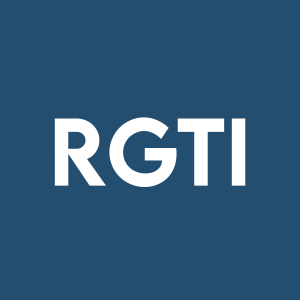Quantum Machines and Rigetti Announce Successful AI-Powered Calibration of a Quantum Computer
Rhea-AI Summary
Quantum Machines and Rigetti Computing (RGTI) have announced successful AI-powered automated calibration of a quantum computer. The achievement was part of the 'AI for Quantum Calibration Challenge' at the Israeli Quantum Computing Center, where two companies, Quantum Elements and Qruise, calibrated a 9-qubit Rigetti Novera™ QPU integrated with Quantum Machines' OPX1000 control system.
Quantum Elements achieved 99.9% single-qubit gate fidelity and 98.5% two-qubit gate fidelity, while Qruise successfully fine-tuned all nine qubits simultaneously. The breakthrough addresses a major bottleneck in quantum computing scaling, as traditional manual calibration by quantum physicists becomes impractical with larger systems. Both companies have joined the Novera QPU Partner Program, expanding the ecosystem of quantum computing technology providers.
Positive
- Achievement of 99.9% single-qubit gate fidelity and 98.5% two-qubit gate fidelity
- Successful automation of complex calibration process that typically takes weeks of manual work
- Integration with NVIDIA DGX Quantum platform enhancing operational capabilities
- Expansion of partner ecosystem through Novera QPU Partner Program
Negative
- None.
News Market Reaction
On the day this news was published, RGTI gained 45.19%, reflecting a significant positive market reaction.
Data tracked by StockTitan Argus on the day of publication.
AI-powered tools from Quantum Elements and Qruise remotely automated the calibration of a Rigetti QPU integrated with Quantum Machines’ control system. This work was part of the “AI for Quantum Calibration Challenge” hosted at the Israeli Quantum Computing Center.
TEL AVIV, Israel and BERKELEY, Calif., Dec. 10, 2024 (GLOBE NEWSWIRE) -- Quantum Machines, the leading provider of processor-based quantum controllers and Rigetti Computing (Nasdaq: RGTI), a pioneer in full-stack quantum-classical computing, today announced the successful application of AI to automate the calibration of a quantum computer. The work was completed as part of the “AI for Quantum Calibration Challenge” (the “Challenge") that was jointly issued by Rigetti and Quantum Machines and hosted at the Israeli Quantum Computing Center (IQCC).
The two companies participating in the Challenge, Quantum Elements and Qruise, automated the calibration of a 9-qubit Rigetti Novera™ QPU integrated with Quantum Machines’ advanced OPX1000 control system and NVIDIA DGX Quantum, a unified system for quantum-classical computing that NVIDIA built with Quantum Machines. This achievement not only showcases the potential of AI in quantum computer calibration, but also highlights the growing maturity and collaboration within the quantum computing ecosystem.
Quantum Elements used their software to achieve high accuracy in setting up individual and pairs of qubits, reaching
As the industry scales the number of qubits in quantum computing systems, it grapples with increasingly complex calibration requirements. “Calibrating quantum computers has become one of the most significant bottlenecks in scaling quantum systems,” said Dr. Yonatan Cohen, co-founder and CTO of Quantum Machines. “Today, it can take weeks to months of expert time to develop the model to properly calibrate even a modest-sized quantum processor, and hours, sometimes daily, to re-run those calibrations. Each qubit requires careful tuning of dozens of parameters, and these parameters drift over time and interact with each other in complex ways. As we move toward systems with thousands of qubits, the challenge becomes exponentially more difficult. The traditional approach of manual calibration by quantum physicists simply won't scale with our ambitions for larger quantum computers.”
“These results demonstrate the remarkable potential of AI-powered calibration tools in quantum computing,” said David Rivas, CTO at Rigetti Computing. “Using automated processes, both Qruise and Quantum Elements achieved performance levels matching our rigorous system specifications – work that can require weeks of manual tuning by a skilled engineering team. As we advance toward larger qubit counts, having validated that AI tools can reach our performance benchmarks is an exciting moment for the industry. This successful demonstration shows how automation accelerates quantum computer setup while maintaining the exacting standards required for quantum computation. We look forward to seeing these tools used by our customers who have both our Novera QPU and Quantum Machines’ control.”
“AI is a critical tool for advancing quantum computing,” said Tim Costa, Senior Director of CAE, EDA and Quantum at NVIDIA. “This latest work shows how the scalable control of quantum hardware needed for useful applications hinges on advances in AI.”
This achievement builds on Quantum Machines' ongoing work with NVIDIA to leverage AI in quantum computing operations. In September, Quantum Machines worked with NVIDIA to demonstrate the successful use of reinforcement learning to optimize a control pulse for a Rigetti QPU in real time using the NVIDIA DGX Quantum platform. As the industry moves toward larger systems with thousands of qubits, the combination of automated calibration tools and real-time AI-powered optimization has the potential to remove key bottlenecks in quantum computer operation while maintaining the high fidelities needed for practical quantum computation.
Additionally, both Quantum Elements and Qruise have joined Quantum Machines as members of the Novera QPU Partner Program, an ecosystem of quantum computing technology providers who build and offer integral components of a functional quantum computing system. Novera QPU customers who need control systems, a dilution refrigerator, and quantum computing software tools can leverage Rigetti’s network of partners to streamline their journey for selecting and integrating their preferred technology with the Novera QPU.
The 9-qubit Novera QPU is based on Rigetti’s Ankaa™-class architecture featuring tunable couplers and a square lattice for denser connectivity and fast two-qubit operations. The Novera QPU has been sold to leading national labs, including the Superconducting Quantum Materials and Systems Center led by Fermilab and the Air Force Research Lab, and Horizon Quantum Computing based in Singapore.
About Quantum Machines
Quantum Machines (QM) drives quantum breakthroughs that accelerate the realization of practical quantum computers. The company’s Quantum Orchestration Platform (QOP) fundamentally redefines the control and operations architecture of quantum processors. The full-stack hardware and software platform is capable of running even the most complex algorithms right out of the box, including quantum error correction, multi-qubit calibration, and more. Helping achieve the full potential of any quantum processor, the QOP allows for unprecedented advancement and speed-up of quantum technologies as well as the ability to scale to thousands of qubits. Visit us at: www.quantum-machines.co
About Rigetti
Rigetti is a pioneer in full-stack quantum computing. The Company has operated quantum computers over the cloud since 2017 and serves global enterprise, government, and research clients through its Rigetti Quantum Cloud Services platform. The Company’s proprietary quantum-classical infrastructure provides high performance integration with public and private clouds for practical quantum computing. Rigetti has developed the industry’s first multi-chip quantum processor for scalable quantum computing systems. The Company designs and manufactures its chips in-house at Fab-1, the industry’s first dedicated and integrated quantum device manufacturing facility. Learn more at www.rigetti.com.
Quantum Machines Media Contact:
Gavriel Cohen
Concrete Media for Quantum Machines
QM@concrete.media
Rigetti Computing Media Contact:
press@rigetti.com
Cautionary Language Concerning Forward-Looking Statements
Certain statements in this communication may be considered “forward-looking statements” within the meaning of the federal securities laws, including statements with respect to the Company’s expectations with respect to its future success and performance, including expectations with respect to the application of AI to automate the calibration of the Company’s QPUs; expectations with respect to future sales or leases of the Novera QPU; customer adoption of the Ankaa-class systems and Novera QPU; the success of the Novera QPU Partner Program; expectations with respect to scaling to create larger qubit systems without sacrificing gate performance using the Company’s modular chip architecture, including expectations with respect to the Company’s anticipated systems; expectations with respect to the Company’s partners and customers and the quantum computing plans and activities thereof; and expectations with respect to the anticipated stages of quantum technology maturation, including the Company’s ability to develop a quantum computer that is able to solve practical, operationally relevant problems significantly better, faster, or cheaper than a current classical solution and achieve quantum advantage on the anticipated timing or at all; expectations with respect to the quantum computing industry and related industries. These forward-looking statements are based upon estimates and assumptions that, while considered reasonable by the Company and its management, are inherently uncertain. Factors that may cause actual results to differ materially from current expectations include, but are not limited to: the Company’s ability to achieve milestones, technological advancements, including with respect to its technology roadmap, help unlock quantum computing, and develop practical applications; the ability of the Company to obtain government contracts successfully and in a timely manner and the availability of government funding; the potential of quantum computing; the ability of the Company to expand its QPU sales and the Novera QPU Partnership Program; the success of the Company’s partnerships and collaborations; the Company’s ability to accelerate its development of multiple generations of quantum processors; the outcome of any legal proceedings that may be instituted against the Company or others; the ability to maintain relationships with customers and suppliers and attract and retain management and key employees; costs related to operating as a public company; changes in applicable laws or regulations; the possibility that the Company may be adversely affected by other economic, business, or competitive factors; the Company’s estimates of expenses and profitability; the evolution of the markets in which the Company competes; the ability of the Company to implement its strategic initiatives, expansion plans and continue to innovate its existing services; the expected use of proceeds from the Company’s past and future financings or other capital; the sufficiency of the Company’s cash resources; unfavorable conditions in the Company’s industry, the global economy or global supply chain, including financial and credit market fluctuations and uncertainty, rising inflation and interest rates, disruptions in banking systems, increased costs, international trade relations, political turmoil, natural catastrophes, warfare (such as the ongoing military conflict between Russia and Ukraine and related sanctions and the state of war between Israel, Hamas and Hezbollah and related threat of a larger conflict), and terrorist attacks; the Company’s ability to maintain compliance with the continued listing standards of the Nasdaq Capital Market; and other risks and uncertainties set forth in the section entitled “Risk Factors” and “Cautionary Note Regarding Forward-Looking Statements” in the Company’s Annual Report on Form 10-K for the year ended December 31, 2023 and Quarterly Report on Form 10-Q for the quarter ended September 30, 2024, and other documents filed by the Company from time to time with the SEC. These filings identify and address other important risks and uncertainties that could cause actual events and results to differ materially from those contained in the forward-looking statements. Forward-looking statements speak only as of the date they are made. Readers are cautioned not to put undue reliance on forward-looking statements, and the Company assumes no obligation and does not intend to update or revise these forward-looking statements other than as required by applicable law. The Company does not give any assurance that it will achieve its expectations.








